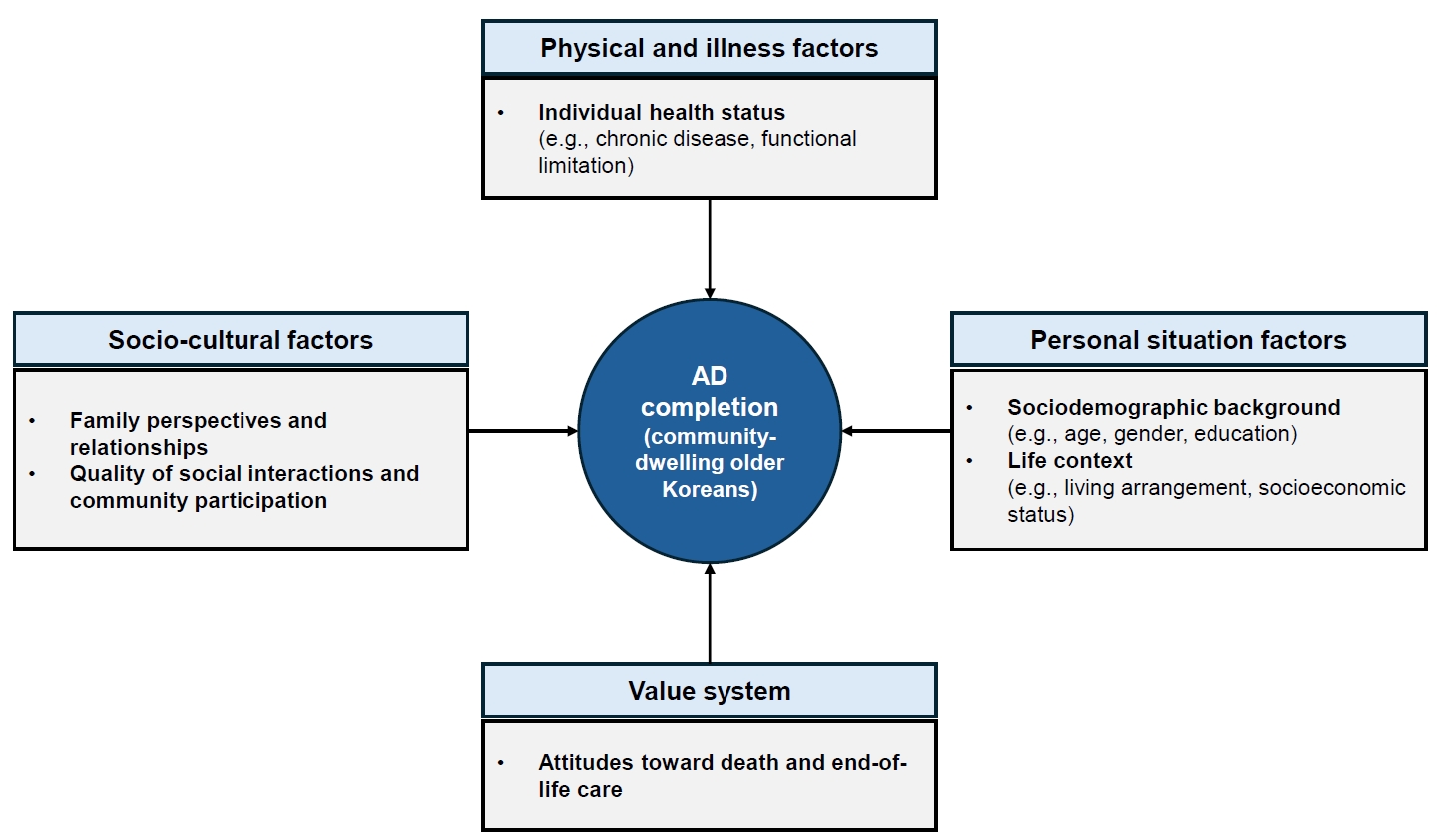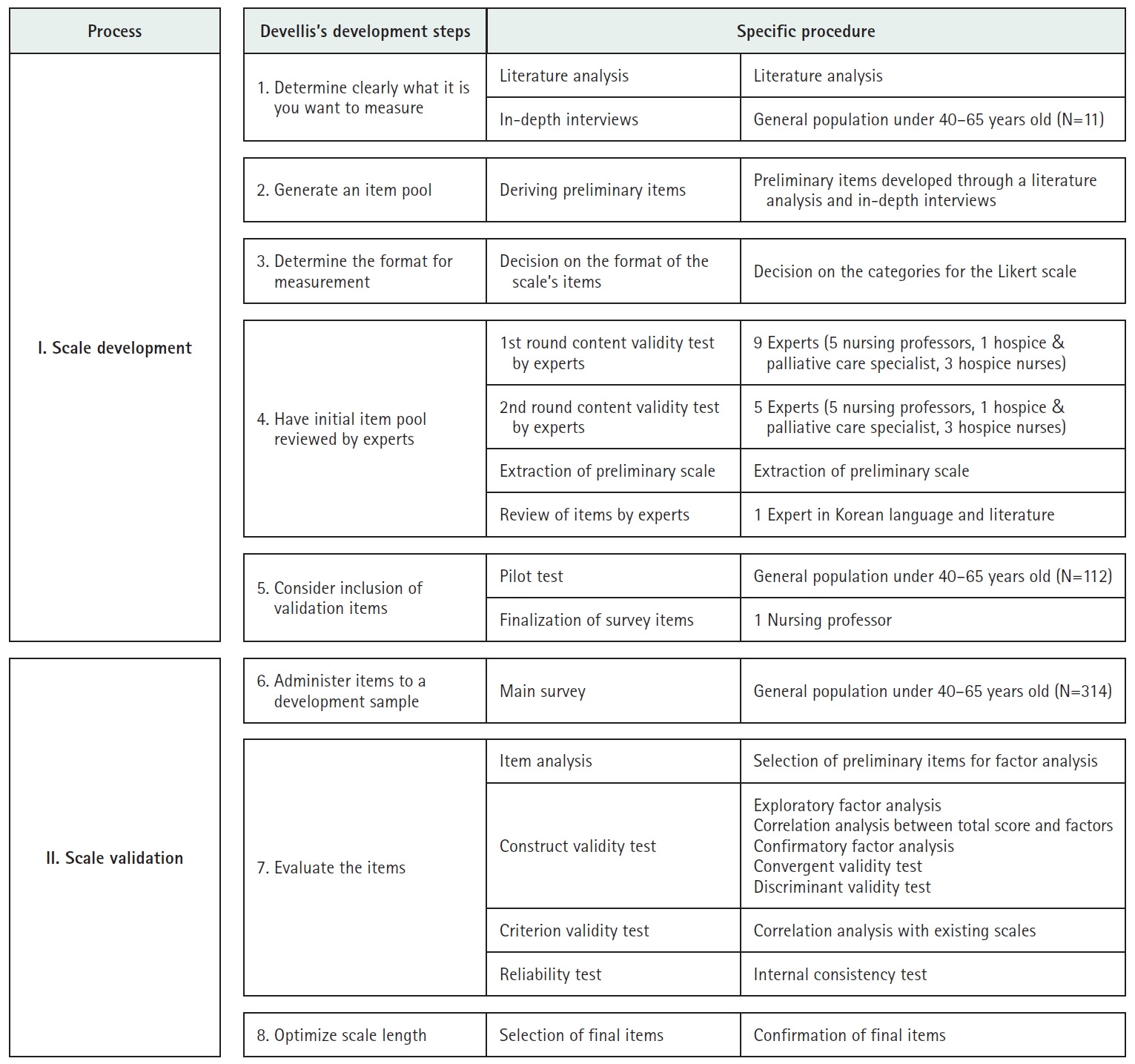Search
- Page Path
- HOME > Search
- Multidimensional factors influencing the completion of advance directives among community-dwelling older Koreans
- Hee-Ju Ji, Soong-Nang Jang
- J Korean Acad Nurs 2025;55(4):543-556. Published online November 18, 2025
- DOI: https://doi.org/10.4040/jkan.25098

-
 Abstract
Abstract
 PDF
PDF ePub
ePub - Purpose
This study aimed to examine the multidimensional factors associated with the completion of advance directives (ADs) among community-dwelling older Koreans, guided by conceptual frameworks developed in Asian contexts.
Methods
Data from the 2023 National Survey of Older Koreans (sixth wave) were analyzed for 9,951 community-dwelling older Koreans aged 65 years or older. Complex sample cross-tabulation and binary logistic regression analyses were conducted.
Results
In total, 11.1% of community-dwelling older Koreans had completed an AD. Significant factors associated with AD completion were identified across four domains—personal situation: age, educational level, religion, and housing preference in the event of poor health; socio-cultural: presence of children, participation in social activities and satisfaction with social relationships; physical and illness: the number of chronic diseases; and value system: awareness of hospice and palliative services, participation in death preparedness education, and documentation of organ donation.
Conclusion
Among older Koreans, AD completion represents more than a documentation process; it reflects a complex decision-making process shaped by their values and life circumstances, underscoring the need for supportive interventions. As the highest AD completion rates are found among older adults, related policies should be aligned with older adult-centered policy frameworks.
- 1,562 View
- 157 Download

- Development of a well-dying awareness scale for middle-aged adults in Korea: a mixed-methods study
- Yu Jin Jung, Eun Joung Choi
- J Korean Acad Nurs 2025;55(2):285-300. Published online March 28, 2025
- DOI: https://doi.org/10.4040/jkan.24121

-
 Abstract
Abstract
 PDF
PDF ePub
ePub - Purpose
This study aimed to develop a valid and reliable tool to measure awareness of well-dying among middle-aged adults.
Methods
A mixed-methods approach was adopted, consisting of a qualitative phase to identify the characteristics of well-dying and a quantitative phase to validate the instrument with middle-aged participants. Initially, 76 items were generated through a literature review and in-depth interviews, and these were reduced to 35 items through expert validation. A pilot survey was conducted with 112 individuals aged 40–65, selected via quota sampling from 17 administrative regions in South Korea. Based on the pilot survey results, the instrument was refined to 32 items for the main survey. The main survey included 314 participants recruited through quota sampling in Busan and Ulsan Metropolitan Cities and Gyeongsang Region. Exploratory factor analysis (EFA), confirmatory factor analysis (CFA), and reliability testing were performed to validate the instrument.
Results
The final scale comprised 23 items across six factors. EFA demonstrated an explanatory power of 69.1%, with factor loadings ranging from 0.53 to 0.88. CFA confirmed the instrument’s validity, and reliability was established with a Cronbach’s α of .93.
Conclusion
This instrument is a validated and reliable tool for measuring middle-aged individuals’ awareness of well-dying. It can serve as an effective resource for evaluating and assessing well-dying awareness in the middle-aged population.
- 2,920 View
- 200 Download

- Review on Advance Directives
- Shin Mi Kim, Soon Yi Kim, Mee Ae Lee
- Journal of Korean Academy of Nursing 2001;31(2):279-291. Published online March 29, 2017
- DOI: https://doi.org/10.4040/jkan.2001.31.2.279
-
 Abstract
Abstract
 PDF
PDF Rapid progress in modern medical technology has made it possible to sustain life and/or delay death using 'heroic' treatments. The availability of life-sustaining treatment brings several issues in end-of-life care such as 'dying with dignity' and an radical increase in health care costs. The use of Advance Directives(AD) have been widely heralded by health care providers, gerontologists, and advocacy groups as means of protecting patients' right to accept or refuse life-sustaining treatment in end-of-life care. The use of AD can not only improve patients' autonomy and quality of life but also bring efficiency in distributing health care resources. The proportion of older persons in Korean population has been increasing. Those 65 years of age or over were about 7 percent of the population. Death and dying is not limited to older persons, but it is more prevalent among them. In conjunction with an aging population and the increasing prevalence of death, the issues of death and dying will become crucial in near future in terms of 'dying with dignity', 'autonomy', and 'self-control'. This paper attempts to explode and establish the concept of advance directives (AD) based on literature review. Data sources are computer searches with the MEDLINE database. Due to the lack of prior study on AD for a Korean cases, studies abroad are reviewed. This paper suggests the need for future study on the possibility of the use of AD in Korea.
-
Citations
Citations to this article as recorded by- The Effects of Ego Integrity Trait of Elderly Persons on Life-sustaining Treatment Preferences
Mee-Ae Lee
Journal of Digital Convergence.2016; 14(2): 489. CrossRef - Attitudes toward Advance Directives of Older Adults using Senior Centers
Hae-Lim Lee, Yeon-Hwan Park
Journal of Korean Gerontological Nursing.2014; 16(2): 160. CrossRef - Comparing the Preference for Terminal Care in Nurses and Patients
Dong Soon Kim, AeYoung So, Kyung-Sook Lee, Jung Sook Choi
Journal of muscle and joint health.2013; 20(3): 214. CrossRef - The Preference for Care Near the End of Life of Korean Nurses
Hyun Sook Kim, Shinmi Kim, Su Jeong Yu, Moungok Kim
The Korean Journal of Hospice and Palliative Care.2010; 13(1): 41. CrossRef
- The Effects of Ego Integrity Trait of Elderly Persons on Life-sustaining Treatment Preferences
- 770 View
- 1 Download
- 4 Crossref

- Prerequisite for Korean Advance Directives: From the View of Healthcare Providers
- Shin Mi Kim, Sun Woo Hong, Young Eun, Su Jin Koh
- J Korean Acad Nurs 2012;42(4):486-495. Published online August 31, 2012
- DOI: https://doi.org/10.4040/jkan.2012.42.4.486
-
 Abstract
Abstract
 PDF
PDF Purpose The purpose of this study was to explore the main prerequisite for Korean Advance Directives [KAD] to ensure their better use.
Methods Data were collected from two focus group interviews and individual email responses. Study participants were 5 doctors and 6 nurses. All interview data were transcribed and analyzed using qualitative content analysis.
Results Three main themes emerged; establishing a philosophy of KAD, protocol to practice KAD, and the KAD document itself. A philosophy is needed to ensure individual needs, consensus to practice AD and identify principle agents. The core of protocol was found to be as follows; 1) process, 2) premise, 3) procedure, 4) contextual preparation, 5) timing, 6) feasibility. Component and feasibility need to be established for the document itself.
Conclusion For a positive acceptance of KAD in Korean society, a culture sensitive, reality based, and user friendly AD needs to be developed.
-
Citations
Citations to this article as recorded by- Barriers to Counseling on Advance Directives Based on Counselors’ Experiences: Focus Group Interviews
Yejin Kim, Shin Hye Yoo, Wonho Choi, Min Sun Kim, Hye Yoon Park, Bhumsuk Keam
The Korean Journal of Hospice and Palliative Care.2020; 23(3): 126. CrossRef - Development of Advance Directives for Nursing Home Residents
Kyem Ju Lee, Sung Ok Chang
Journal of Korean Gerontological Nursing.2019; 21(2): 75. CrossRef - Feasibility of the Korean-Advance Directives Among Community-Dwelling Elderly Persons
Shinmi Kim, Sun Woo Hong, JinShil Kim
Holistic Nursing Practice.2017; 31(4): 234. CrossRef - End-of-life care decisions using a Korean advance directive among cancer patient–caregiver dyads
Shinmi Kim, Sujin Koh, Kwonoh Park, Jinshil Kim
Palliative and Supportive Care.2017; 15(1): 77. CrossRef - Validation of the Decisional Conflict Scale for Evaluating Advance Care Decision Conflict in Community-dwelling Older Adults
JinShil Kim, Shinmi Kim, Sun Woo Hong, Se-Won Kang, Minjeong An
Asian Nursing Research.2017; 11(4): 297. CrossRef - Predictors of Agreement With Writing Advance Directives Among Older Korean Adults
Jaewon Park, Jun-Ah Song
Journal of Transcultural Nursing.2016; 27(6): 574. CrossRef - Relationship of social support and decisional conflict to advance directives attitude in Korean older adults: A community‐based cross‐sectional study
JuHee Lee, Dukyoo Jung, MoonKi Choi
Japan Journal of Nursing Science.2016; 13(1): 29. CrossRef - The Evaluation of the Korean Advance Directives (K-AD)
KiSook Kim, Shinmi Kim, Sunwoo Hong, JinShil Kim
The Korean Journal of Hospice and Palliative Care.2016; 19(2): 109. CrossRef - The Current Status of End-of-Life Care in Korea and Legislation of Well-Dying Act
Ji Eun Lee, Ae Jin Goo, Be Long Cho
Journal of the Korean Geriatrics Society.2016; 20(2): 65. CrossRef - Ethical Attitudes according to Education and Clinical Experience of Do-Not-Resuscitate (DNR)
Young Ae Kae, Mi Yeon Lee, Jin Sook Park, Hyo Joo Kim, Tae Youn Jung, Bo Young Jang, Yoon Jeong Kim, Dong-Hoe Koo
The Korean Journal of Hospice and Palliative Care.2015; 18(3): 208. CrossRef - Feasibility Evaluation of Korean Advance Directives (K-AD)
Shin Mi Kim, Sun Woo Hong, Jin Shil Kim, Ki Sook Kim
The Journal of Korean Academic Society of Nursing Education.2014; 20(4): 639. CrossRef - Factor structure investigation of perceived facilitators and barriers in end‐of‐life care among Korean nurses
JuHee Lee, Mona Choi, So‐sun Kim, Renea Beckstrand
Japan Journal of Nursing Science.2014; 11(2): 135. CrossRef - Facilitators and Barriers to Use of Advance Directives in Korea
JinShil Kim, Shinmi Kim, Sunwoo Hong
Journal of Hospice & Palliative Nursing.2013; 15(7): 410. CrossRef - Development of a Korean Version of an Advance Directive Model via Cognitive Interview
Shin Mi Kim, Young Sun Hong, Sun Woo Hong, Jin Shil Kim, Ki Sook Kim
Korean Journal of Hospice and Palliative Care.2013; 16(1): 20. CrossRef - Development of a Korean Version of an Advance Directive Model via Cognitive Interview
Shin Mi Kim, Young Sun Hong, Sun Woo Hong, Jin Shil Kim, Ki Sook Kim
The Korean Journal of Hospice and Palliative Care.2013; 16(1): 20. CrossRef - Knowledge regarding Advance Directives among Community-dwelling Elderly
Sun Woo Hong, Shin Mi Kim
The Journal of Korean Academic Society of Nursing Education.2013; 19(3): 330. CrossRef
- Barriers to Counseling on Advance Directives Based on Counselors’ Experiences: Focus Group Interviews
- 1,124 View
- 0 Download
- 16 Crossref

 KSNS
KSNS
 E-SUBMISSION
E-SUBMISSION

 First
First Prev
Prev


